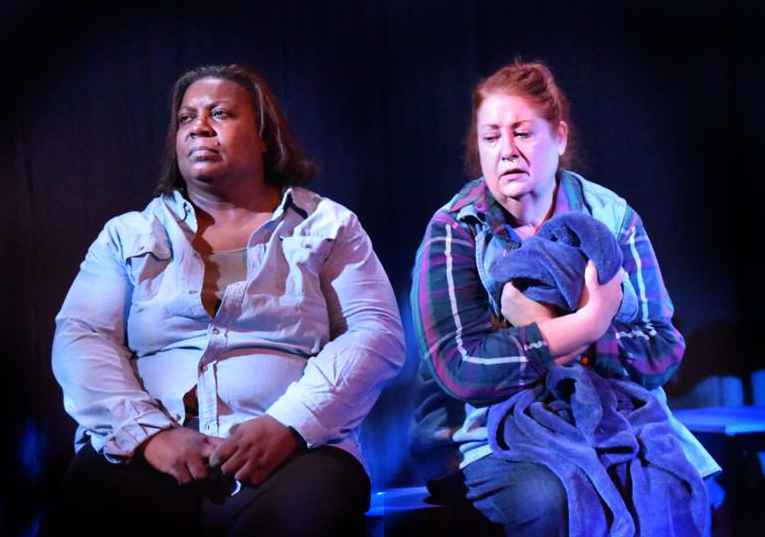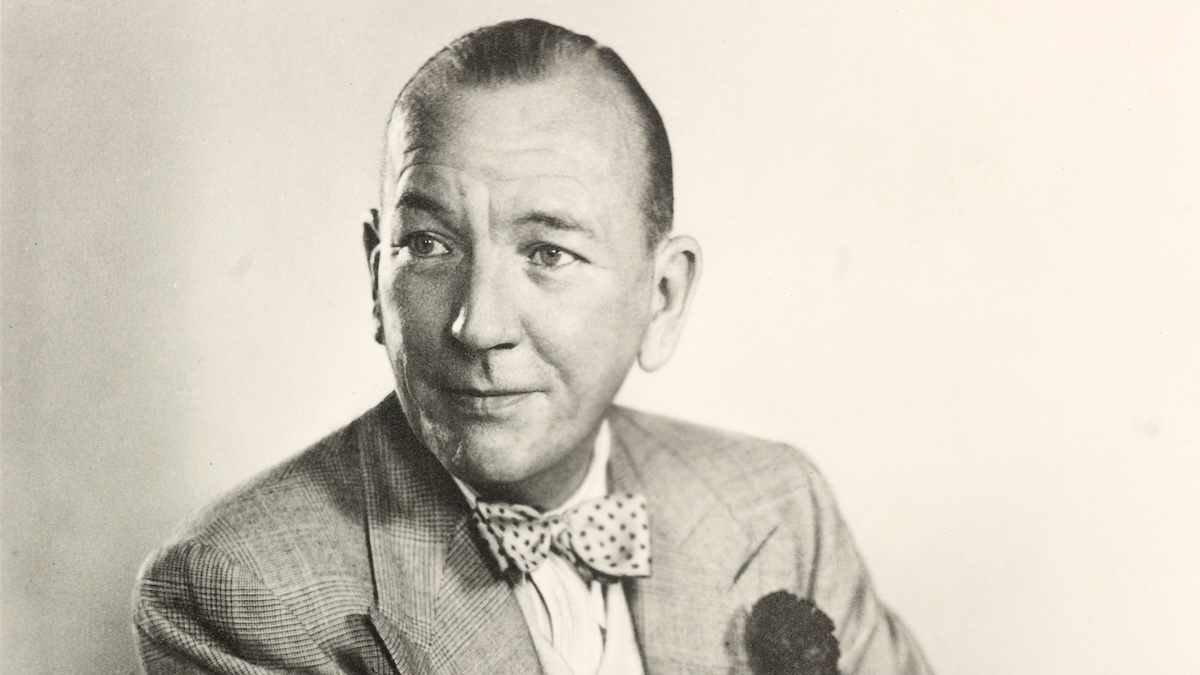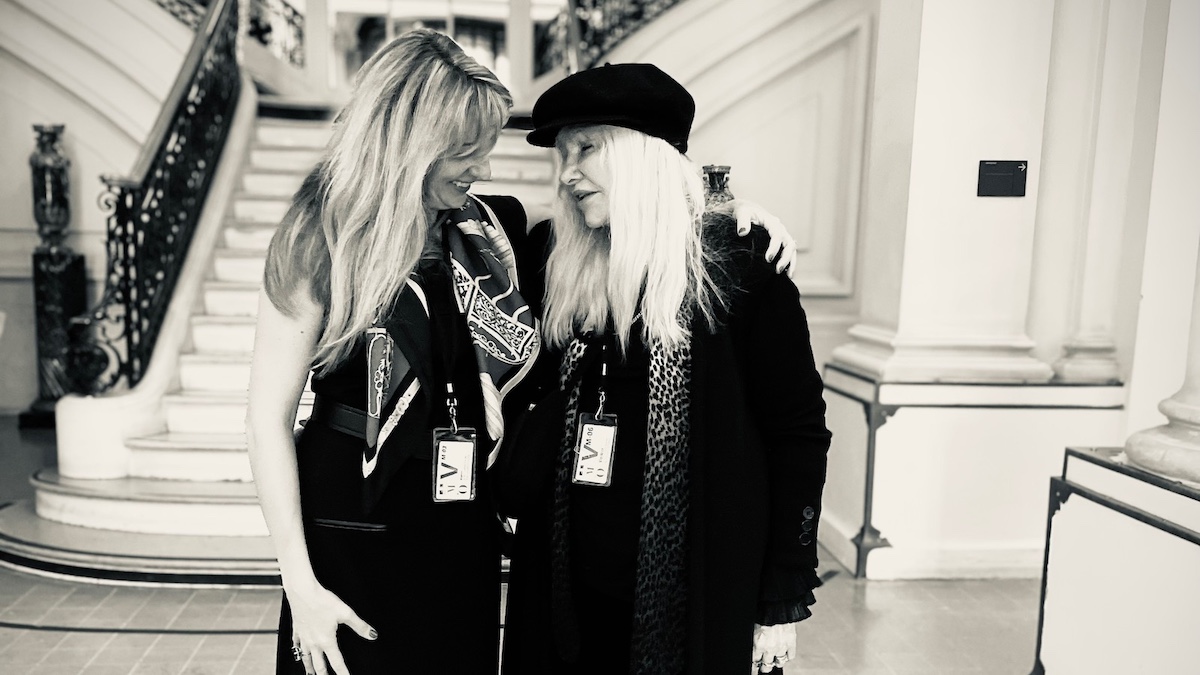
The American canon of dramatic literature is chock-full of Southern dramas. Too often, these regional-specific works are centered on the dysfunctional family attempting to live down, or escape, a shame that has pierced their Southern ethos: a moral purity and stubborn refusal to accept the hardship of a life-changing occurrence. Audrey Cefaly brings a new, vibrant view and vivid voice to the standard Southern disposition. Cefaly strips away the safety of the family bond and leaves us with character pairs who share a conflict, a choice, and a heritage-induced fear of accepting the outcome.
Cefaly’s lovingly-curated collection of character-driven plays, Love Is a Blue Tick Hound (and Other Remedies for the Common Ache), recently concluded its world premiere production at Terrific New Theatre in Birmingham, Alabama. Having seen it myself, I can say it makes for an engaging extended evening of theatre.
Gone are the romanticized family fights for the ownership of Southern Heritage. Cefaly gives us short, intense encounters that threaten, or offer stagnant characters the chance to, change. In Fin and Euba, life-long friends sit on benches with nowhere to go; Clean eavesdrops on a conversation in which a waitress is so lacking in self-esteem, she cannot see the love in her coworker’s glances; Stuck follows lonely divorcees reduced to finding companionship through Internet dating; and The Gulf shows us two lesbian lovers adrift in a relationship, refusing to let go of one another and the pain that binds them together.
Gone are the grand Southern estates. The settings of Blue Tick are the backyard of a boarding house that sits too close to a lonely, dead-end highway; a roadside diner after closing; a hastily renovated apartment with a “broken” door; and a flat-bottomed boat adrift in the shallows of the Gulf of Mexico. Cefaly dispenses with the romanticism of the Southern mystique and instead explores a more universal, poor-but-humble truth of the Southern condition: characters trapped by the pain of their pasts and unable, as of yet, to face the fear of choosing different futures.
In Blue Tick’s first offering, Fin and Euba, Cefaly illustrates the steadfast companionship of the Southern friendship: two friends, almost assuredly from grade school, are now mill workers, bound together in their meager existence. They labor through life. But Fin has plans for Euba. She has taken Euba’s photographs — photographs that clearly showcase Euba’s artistry — and sent them to the executive editor of LIFE magazine. Now Euba holds in her hand the return envelope from LIFE, and is unable to open it. If it is a rejection — and in her heart it most certainly is — her dream, her life, is proven meaningless, which is more than she can handle. Fin implores Euba to open the envelope. Euba retreats into silence and threatens to burn the envelope with the contents, good or bad, sealed inside. Cefaly is a master of the use of silence. In the same way she strips away the grandeur of the Southern mystique, she strips the Southern vocabulary bare for her characters. Their most important “words” and actions are not accomplished with speeches, but left unsaid. ( See Silence is Golden: The Electric Properties of Subtext in Playwriting.)
FIN: It’s tough. I know. But…it might help if you remember…God never gives us more than we can handle.
(EUBA slowly turns and stares blankly at FIN.)
FIN: Well sometimes. Sometimes he does. Sometimes, it is just a little bit more than we can handle.
(FIN finally breaks the silence.)
FIN: But that’s why we have each other.
It’s not that Euba doesn’t want more out of life. She does. But Euba is unable to romanticize her life and refuses to acknowledge its nobility. Her only desire is dignity. You can hear it in Euba’s dialect; the sweet, slow sounds of the South, when she breaks her silence and dreams of escape:
EUBA: Do I dream about it? Yes! Of course, I do. When I’m out there on that line all day and my feet are so swole up I can’t think straight. I dream about it. Or when Bugger James comes into my room ’stead of his own at four a.m. cuz he’s so blind from drunk, I dream about it. Or how ’bout, every mornin’ scrambling for a warm shower ’stead of ice cold, cuz I slept in two minutes late. Fin, I dream about getting out every minute of every day of my life.
For Euba, the choice of acknowledging her existence is unbearable. It is neither meager nor noble. It is simply hers and nothing more. She’s content right where she is — stuck on the side of life’s “nowhere” highway.
FIN: Well, what are you waitin’ for? (holding up the letter) This is your chance, Euba.
EUBA: (taking the letter) Because. If I open this letter. And it says what I know it’s gonna say…
FIN: What?
EUBA: Then I have nothin’.
With the letter, Euba has nothing. Without the letter, she can breathe. Euba tears the letter up, sets it ablaze, and lights a cigarette from its burning flames. She’s back in control of her life: “Now, this is my life. MY LIFE! And it’s mine for me to decide if I want to throw it away, you got that?” Amazingly, we don’t look at Euba’s choice as a tragedy, but as a necessity of salvaging her dignity, her Southern disposition.
The tone of Blue Tick shifts for its second and third installments. While characters clinging to their pasts remain central, the need for love is added. Now we see the shakiness of new love and curious awakenings, as characters step into the unknown.
In Clean, Lina, having slipped and fallen, lies on her back in the middle of a restaurant after closing time. Roberto, an immigrant dishwasher, comes to her aid after discovering her on the cold tile floor. The two have been coworkers for five years, and yet today is their first real conversation. Roberto claims he doesn’t have a girlfriend, while Lina exclaims she is through with love: “When you stop believing in happily-ever-afters, Roberto, you can’t be disappointed when there isn’t one.” Roberto, increasingly weary of Lina’s negative self-talk, approaches her intently: “Your life has meaning, Lina.” He reveals a journal in which he has written his thoughts and observations about her:
LINA: (reading) She walks along Canal Street. She eats a tangerine, the color of her dress. It is the color of the sun and she leaves me without air…without the air to breathe.
Lina is left speechless. Faced with a choice to move forward toward an unexpected future, the two kiss, and the play ends with Lina simply saying, “Si.”
Stuck is similar in structure and also involves moments of unexpected love. As with Clean, we see a woman’s unending self-denial after years of disillusionment (one of Cefaly’s signature themes). Betty and Bob, both divorced, are on their second Internet date. Betty is seemingly self-reliant,
assertive, and she lets on that she is very attracted to confident men. Bob, eager to please, plays along, agreeing to allow Betty to pierce his ear before they venture out for the evening. After the piercing, Bob is left alone, in pain and, as the script so aptly puts it, “flopping over furniture as if being chased by bees.” When Betty discovers that Bob was merely playing along to make her happy, she is mortified. In the softer moments toward the end of the play, Bob shares his true inner nature by recalling a story from his childhood and comparing the story to Betty:
BOB: There’s this…perfect little tree…alone…waiting…and along comes this family…and they take the little tree home and they put her in a warm, safe corner with a really great view of the city. And they give her a blanket for her feet and a star for her hair…and they gather up all the golden threads and shiny ornaments and give them to the little tree to hold…so then the little tree is happy…and beautiful…and loved. And no longer alone.
There is an innocence to the way the men in Clean and Stuck reveal their affinities for Lina and Betty, respectively. This innocence is at once endearing and hopeful. Happy endings are given a chance.
Cefaly concludes her quartet of short plays with a one-act version of her full-length play, The Gulf. Once again, we see characters stuck in accepted existences. Kendra and Betty are lovers. Kendra, content with the simplicity and reliability of a life on the Gulf, is a set-in-her-ways sewage plant worker. Betty, seemingly more adventurous, is set on going to junior college to study social work a hundred miles away from Kendra. They are out in the shallows of the water, adrift in a flat-bottomed boat. Kendra baits a hook and casts a line with the finesse of a life-long angler. She is able to clean and gut her catch with near-primal indifference. In contrast, Betty is entranced by the still-beating heart and wonders how long it can continue beating in its same old pattern before finally giving out. Betty challenges this allegiance to routine by asking Kendra why they always fish in the shallows, and Kendra’s unwittingly cogent and foreboding response sums up the full scope of their doomed relationship.
KENDRA: Fish in the shallows, cuz that’s where the fish are. Reds like to fight, Betty, they fight…deep, shallow, whatever, any water. But in the shallows, they get more traction, see, the fight is bigger…more fun.
And so, in the shallows of the Gulf, the fight gets bigger between the two. Instead of fishing, Betty has spent the morning diagnosing Kendra’s “dead-end” job situation with the help of What Color Is Your Parachute: A Practical Manual for Job-Hunters and Career-Changers, in hopes of lighting a fire under Kendra.
BETTY: If you could be anything…anything at all…in the whole wide world, what would it be?
KENDRA: Alone.
And as Betty yearns to move forward and escape the shallows, Kendra drops anchor.
KENDRA: You never fish, Betty. And you don’t want to learn, either, you just want to sit there with your books and your papers and what not, and rearrange my life to make it fit yours in some magical futuristic happy place that exists where…I don’t know…in your mind, maybe? Meanwhile, I’m doing it. I’m taking part in the miraculousness of life, Betty. REAL LIFE. Where folks catch fish, rip their fucking guts out, and then eat ’em. And they don’t think twice about it, and you know why? Cuz it’s just fishin’!
Kendra refuses to change, to adapt. She is rooted in her heritage, adrift in the quiet waters of the Southern shore.
Cefaly’s South offers a grittier — yet gentler — view than the more romanticized plays of yesterday. And since Cefaly doesn’t trap her characters in the cultural customs of the South, they aren’t imprisoned by their Southern accents. Cefaly describes herself as a pragmatic and boldly states at the beginning of Blue Tick that these characters can actually be of most any age and ethnicity, giving the characters over to the shared nature of humanity and allowing the producing company ultimate flexibility with casting. Since the plots of the plays are sparse and not entrenched in the rituals of the Southern experience, their ingrained Southern Heritage becomes universal.
There are highways, diners, apartments, and shallow, still waters all across the diverse topography of America. Cefaly specializes in those from the South, but, in reality, they are everywhere, as are her characters, who face the universal choice between the fear of change or bearing the acceptance of a lifeless-but-reliable existence.

Noël Coward’s Travels

Kate Chopin in New Orleans: Mother-Daughter Author Duo Collaborate on Historical Book

